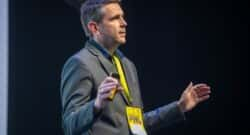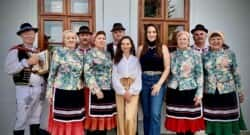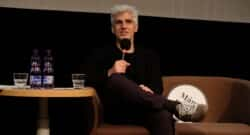Author: Tamara Mrázová
Embassy of United States of America in Slovakia reacts to the topic of gender equality
Gender equal pay has become one of the most mentioned topics nowadays. Do women and men receive the appropriate amount of money for their work? We got the chance to discuss this topic with the Ambassador of the U.S. Embassy in Slovakia, Gautam A. Rana, to explore strategies and progress in addressing this vital issue. Are there any typical stereotypes between genders in your home country? Have you encountered any visible differences in Slovakia? While the United States has made significant strides in breaking down gender stereotypes, there are still lingering perceptions that vary across different regions and demographics. It’s also important to note that we still have a wage gap issue in the U.S. as well – in 2023 women in the United States made about 82 cents for every dollar earned by men. However, even though there is clearly a long way to go, it’s important to note that these stereotypes are increasingly being challenged and redefined, with many individuals and communities advocating for gender equality and breaking free from these outdated expectations. The wage gap is also slowly closing – twenty years ago, women were making 65 cents for every dollar earned by men. Similar wage gaps exist in Slovakia. According to Slovakia’s Labor Ministry’s Institute of Social Policy’s annual Report on Social Situation of the Slovak Population in 2022, women in Slovakia received 84 cents for every euro earned by men. However, much like the United States, efforts are being made to combat these in order to promote inclusion and equality across society. For example, our embassy has supported AmCham Slovakia’s Equal Pay Day Conference to call attention to the issue. Women can perform their jobs as professionally as men. Why do you think men earn more annually than women? The gender pay gap is complex and often rooted in historical biases and stereotypes. The United States is committed to efforts to ensure equality under the law, fair pay, and equal opportunities for all, including initiatives to promote access to high-paying jobs, enhance understanding of pay disparities, and address occupational segregation. These actions complement existing measures aimed at bolstering women’s economic security, including initiatives to expand access to good-paying jobs, improve childcare affordability, increase the minimum wage, and support women-owned businesses. This multi-faceted approach can help to advance pay equity, strengthen the economy, and foster inclusive prosperity. What are the characteristic traits that working women have that men tend to lack? It’s important to recognize that individuals, regardless of gender, possess a diverse range of skills and traits that contribute to success in the professional environment. We should focus on recognizing and valuing the unique skills, talents, and perspectives that each individual brings to their work, regardless of gender. This approach fosters a more inclusive and equitable workplace culture where everyone can thrive based on their abilities and contributions. Both men and women can contribute equally and valuably to the professional environment. Looking ahead, what priorities does your embassy have in advancing gender equality and ensuring equal opportunities for women and men in Slovakia? As the U.S. Ambassador to Slovakia, advancing gender equality and ensuring equal opportunities for women and men is a priority for the United States. We are committed to supporting initiatives that promote women’s empowerment, gender equality, and the elimination of gender-based violence and discrimination around the world. Our embassy works closely with the Slovak government to promote gender equality in areas such as education, employment, healthcare, and political participation. We also support initiatives to address gender-based violence and discrimination, as well as promote women’s economic empowerment and entrepreneurship. By collaborating with our Slovak partners, we aim to create a more inclusive and equitable society where all individuals, regardless of gender, have the opportunity to reach their full potential. Link to U.S. Embassy webpage: https://sk.usembassy.gov/ To learn more about Equal Pay Initiative, join us on our special Equal Pay Day event: Equal Pay Day 2024 – All inclusive vstupenka https://eshop.akcnezeny.sk/produkt/equal-pay-day-2024-all-inclusive-vstupenka/
Situation in Lebanon’s hospitals is alarming. People are suffering and need immediate help.
Lebanon, the land of wonders, but also sadness. On one hand, this country incredibly surprises its visitors not only with its beauty but also with the kindness of its people. On the other hand, it transfers a message of a huge pain from witnessing poverty, helplessness, and the suffering of people living in there. Lebanon’s hospitals are facing an alarming situation, as a result of economic collapse, political instability, and the ongoing COVID-19 pandemic pushing them to the brink. The residents of Lebanon have to face severe problems when it comes to health care such as insufficient financial resources and scarcity of medicine needed to maintain the health of the patients stable. We got a chance to talk to some of the authorized workers and management of one of the hospitals located in Lebanon, Notre Dame Des Secours, Centre Hospitalier Univeritairet. The situation is truly alarming and they are in need of help. Here are statements provided by the people of Lebanon suffering from the situation: “I’m tired of being a burden of my family. My daughters, in-laws, grandkids… everyone is suffering because of me. I have never seen my husband cry, only now. At times, he simply cannot gather enough money for my treatments. I am tired. Tired of this. Everyone around me is tired from the fact that I cannot be medically treated the way I need to be. Even though I am the only one sick in my family, I feel like I am infecting everyone around me. There is no one to give me strength except god.” “I am the house provider and caretaker of my family. My husband is a paraplegic, he’s been paralyzed for 28 years. My kid was 5 when I was first diagnosed. 6 years later, the cancer came back and this time it was in my lungs. Year later it spread to my thyroid. After that, the tests showed that cancer had also reached my bones. I have no stable income, social security, or insurance to rely on.” “Our journey with cancer spans 5 years, during which we faced many hardships. We changed emotionally and physically, but overall our finances suffered the most. We had to sell our most prized possessions, like our kid’s belongings to provide treatment for Nabil, my husband. At one point, we also had to sell some of our home furniture. This situation humbled us and made us grateful for what we own. But hopefully, one day Nabil will heal and we’ll be able to gain everything back.” Statement given by a Lebanon’s doctor: “I know the circumstances are tough. Our community is struggling greatly both economically and socially. I know that when we diagnose a dangerous illness, such as cancer, we need tests, MRIs, PET scans, biopsies, or other expensive procedures. I know it is a life-or-death matter for my patients and also that they cannot cover all of the treatment costs. The price of medications is also quite high. Regardless, we will find a way to help them.” AND NOW WE CAN HELP AS WELL. WE CAN DO SO THROUGH A DONATION. LINK BELOW: https://donio.sk/lieky-pre-chore-deti-z-libanonu LET’S MAKE THIS WORLD A BETTER PLACE. TOGETHER WE CAN.
Pharmacist Karin busts myths: The worst thing we can do when having a fever is to take a cold shower
Nowadays, the topic of health is the subject of constant interest and diverse discussions. With the development of medicine and pharmacology, new drugs and treatment procedures are entering the market. Unfortunately, along with expertise, false ideas about how to treat ourselves when it comes to illnesses, also emerge. With pharmacist Karin Marček Malenovská, we have decided to explore and verify the reality behind the most popular tips and tricks we hear almost every time a disease occurs. Do we believe facts or myths? Karin, what do you do? I live in two professional worlds, since I focus on scientific research, especially on the impact of physical activities on our bodies. Furthermore, I explore the physiology of exercise and also the molecular mechanisms that are triggered within our bodies during exercise. The second world is the pharmaceutical one. I’m a trained pharmacist and I enjoy educating myself in the field of drug usage. Moreover, I share my knowledge through my Instagram profile, where I focus on such topics. What are the most common myths in pharmacy you encounter daily? There is truly a countless number of myths in pharmacy. One them are, for example, myths spread about treating fever. One mistake we make is taking medication too soon. When dealing with fever, it’s important to reduce body temperature to a bearable level at which we are comfortable and can endure it. In an unhealthy state, our goal is not to reach our normal body temperature, as many people think. Therefore, if someone feels comfortable with a temperature of 38.5 degrees during illness, we don’t necessarily need to take any medication. Fever is actually a very helpful tool in fighting illnesses as it’s a mechanism our body uses effectively against viruses and bacteria. By using medication, we lower this immune weapon. Of course, it’s appropriate to take medication when necessary, and they often save us, but it’s important to know how and when to use them. Another myth about fever is related to cold showers. A cold shower causes blood vessels, for example in the extremities, to constrict because it reacts to the cold stimulus and tries to preserve heat in vital organs. Consequently, our body fights this sensation and paradoxically begins to raise its temperature again. During fever, we are often advised to “sweat the illness out”, for example, by consuming hot drinks. Have you ever considered that we drink hot beverages in winter when we want to warm up, but also during illness when we’re trying to lower our body temperature? It’s counterproductive, just like excessive covering with blankets. Our body releases heat through evaporation. When we cover ourselves, heat has nowhere to evaporate, and it’s trapped under the blanket, which can even worsen our condition. DURING FEVER, IT’S GOOD TO COVER WITH SOMETHING LIGHT-WEIGHT, OR TO HAVE A CERTAIN PART OF THE BODY UNCOVERED. What are the latest trends in pharmacy? I’m not sure if we have any freshly newest ones, but there are definitely trends that have been around for a while. For example, collagen, which women use for almost everything, from burning calories, to reducing wrinkles, to fighting cellulite. If all of this were true, the products wouldn’t need as much advertising as they receive. Similar cases include various green foods like barley and chlorella, which are also attributed with many revolutionary effects, but haven’t been scientifically proven. I am sure there’s no one who hasn’t heard of detox. Detox doesn’t work with supplements, but with our own organs, such as the liver and kidneys. As long as a person has these two organs, they detoxify sufficiently every day and don’t need to spend money on overpriced supplements. Can food cure? A balanced and regular diet is the key to success, especially in preventing multiple diseases. In recent years, there has been an increase in the incidence of lifestyle diseases, for which we can blame our own unhealthy lifestyle. An unhealthy lifestyle reflects on our health, and thus changing our lifestyle, such as having a rational and varied diet or exercising, is the best investment in our future. THE RIGHT LIFESTYLE IS THE KEY TO NOT HAVING TO TREAT OURSELVES IN THE FUTURE. One direct example is the so-called “elderly diabetes.” It’s diabetes caused by an unhealthy lifestyle. Age itself is not a disease, and it’s up to us which path we choose for aging. Healthy aging can indeed be achieved. Are there more women or men in pharmacy? Even during school, we had a much higher percentage of women than men. Recently, it has started to balance out a bit, but still, women lead. However, this isn’t just in pharmacy, but also generally in biomedical research. In Slovakia, we have many talented female scientists who are truly great. However, we lack them in higher leadership positions, but that’s because women often go on maternity leave, for example.
Expert Peter Šebo advises on teaching children to navigate the internet: We have to talk about social media with our kids
One of the first things that comes up to our minds when thinking of an indispensable part of our days, is undoubtedly the internet. It comes with a great deal of benefits, not only in the world of business and work, but also in everyday life. The trend of internet surfing is widespread among all age groups, but the greatest emphasis is placed on children and young people. The internet can be a wonderful platform for broadening our horizons, gaining some valuable knowledge, online shopping, playing games, and chatting with friends. Unfortunately, with its growing popularity, various dangers and scams have also emerged, making it easy to fall victim. Children are particularly vulnerable targets for online fraudsters, so it’s crucial to set boundaries and guide them on their journey through the online space. Peter Šebo Peter Šebo, co-founder of the project “Digitálni rodičia” (Digital Parents), is spreading awareness about safe internet usage for our children. He is on his mission to educate parents about the latest online trends and modern technologies. He shared his valuable tips on this topic. Do you perceive the internet and social media as our future? Definitely yes, but not in the form we see it today. We still haven’t learned to use them in a way that’s only meaningful and useful. However, I believe that one day societal norms will be set similarly to how they are in standard commercial media today. THE INTERNET WILL HOPEFULLY BECOME A MEANINGFUL SAFE SPACE ONE DAY. Freedom of speech, but not absolute anarchy. A place where lies mingle with truth, content for children with the one for adults, and opinions are mistakenly exchanged for facts and vice versa. As we see it today, I don’t think it’s a sustainable state in the long run, and it’s dangerous not only for our children. What type of risk does the internet usage come with? Loss of critical thinking and information overload. When there’s too much information without any sorting, people tend to believe the part that appeals to them the most. However, this doesn’t help in guiding society in the right direction or in raising our children. How can a parent contribute to their children using social media safely? First and foremost, as parents, we need to know what our children are doing on social media and which platforms they are active on. It’s not essential for us as parents to spend time directly on these platforms, but rather to understand what each network is for, its strengths and weaknesses, and what threats and opportunities it presents for our children. How to set proper boundaries in order not to become addicted to social media? On one hand, we can do this through technical means such as setting limits in applications, both for ourselves and our children. On the other hand, we can also choose only the services and networks that we truly want to use and not be everywhere just because it’s often expected from us. Or, we can set a daily routine for when we want to dedicate our time, energy, and attention to technology and when we want to stay “offline”. How to filter information properly when it comes to content on social media? The best “information filter” is to talk to children about the content they encounter on the internet, who they are chatting with, and what interests them. As parents, we can better assess whether there might be any threats or malicious intent behind certain content or conversations. In such cases, we can advise them on which content is useful, dangerous, or simply “pointless” and, from our adult perspective, only wastes their time. WE ARE DRAWN TO THAT INFORMATION, WHICH ALIGNS WITH OUR BELIEFS. WE TEND TO BELIEVE IT WHEN WE SEE IT ONLINE, EVEN THOUGH IT MIGHT NOT BE TRUSTWORTHY.
Story of writer Zuzana Palovič: Slovakia is unique to me, because it is my homeland
Zuzana Palovič, a successful writer born in Slovakia, raised in Canada, dedicates her career to raising public awareness about her Slovak homeland. Thanks to living in many different places, the world has become her home. She turned her knowledge and expertise into various books about Slovak history. How would you describe your job? I would say that I’m a writer, I’m a champion on behalf of my homeland, which is Slovakia. We’re a very young country, and we’ve been waiting for our sovereignty for 1,000 years. I feel like I was born at the right time in history to help codify this nation’s story into a global language, English, and share it with as many people in the world as I can. I GET TO LEARN FROM THE PAST AND THANKS TO THAT, SHAPE THE FUTURE OF TOMORROW. How did you become a writer? I was doing my PhD at that time, and I would always think how sad it was, that after my doctoral studies were over, all the research would only stay in my dissertation. I really wanted it to be used and made accessible to the public. So that’s when the idea of writing a book was born. Me and Gabriela Beregházyová, the co-author, strongIy believe the books will long outlive us. They are a legacy and one day will become an important piece of Slovak heritage. What do you write about? We share Slovakia’s story. Different aspects of the country’s history, but all of our books have a specific objective- to empower and educate Slovaks and those interested in Slovakia. For the greater majority of history, we were under the influence of different empires and regimes, most recently it was the Soviet Bloc and Iron Curtain. We never really had the opportunity as a country to interpret our story and create a narrative. I want to help change that, which is why I partnered with Gabriela. I applied all my experience growing up in Canada and living all over the world with her deep knowledge of growing up in Slovakia to create a powerful national story that is attractive to foreigners and Slovaks alike. Every book has a different target audience. The Legend of Linden is a really great introduction to the history of Slovakia. The book is really ideal for Slovak descendants who want to better understand their heritage and roots. On the other hand, Super Slovaks was written for the younger generation. It’s written for teenagers to better understand Slovak history. MY BIGGEST INSPIRATION WHEN WRITING IS SLOVAKIA. Czechoslovakia Beyond the Iron Curtain is perhaps our most popular book. We get monthly emails from readers that have no connection to Slovakia but they are fascinated to discover how the communist apparatus took over a democratic country seemingly overnight. Then, there is The Great Return, a book I firmly believe will one day be in Slovak schools, educating the youth about the importance of freedom of movement, both in terms of self-discovery but also learning. Lastly, our most recent book, Slovak Settlers, covers the great emigration journey of Slovaks to America at the turn of the 19th and 20th centuries. This was a unique time in Slovak and American history, when one third of our nation, at one point some 750,000 Slovaks left their homeland in search of hope across the ocean. How would you convince young Slovaks to stay in Slovakia? As far as I am concerned, 10% of our population lives abroad. That is a huge portion of human capital! What is more, some 20% of our university students are studying at foreign universities. This is a tremendous outflux of talent! Many, once they graduate, they stay on in professional jobs, they contribute their energy, skills and mostly minds to a foreign country. I believe it’s good for our young people to go abroad. They need to be exposed to different cultures, to see the world, to experience cosmopolitanism, to learn languages and so on. But I think, it should be in Slovakia’s interest to attract them back. Maybe not all of them, but at least a key part of them. This can be done through outreach, bridge-building with the Diaspora, but also through strategic policies that make Slovakia an attractive destination for entrepreneurs and families. IT IS A VERY SOBERING EXPERIENCE FOR YOUNG PEOPLE TO SEE THE REALITY OF LIVING ABROAD. What is your favourite part about Slovakia? I love our roots, our agrarian past and common sense and in a way ancient wisdom the people still have. A lot of this has been eroded in the West, but Slovakia only began to experience industrialisation as late as the 1960s. But of course, Slovakia is unique to me, because it is my homeland. It’s my mother culture and language. I feel some kind of loyalty and affinity to this country. I want to serve Slovakia. I want to honour her. I CONSCIOUSLY DECIDED TO SET UP BASE IN SLOVAKIA, BECAUSE I BELIEVE IN THIS COUNTRY’S POTENTIAL. To find out more, visit: https://www.globalslovakia.com/
Max Joseph: The idea of putting a movie together was always really scary, and still is.
Max Joseph, a name synonymous with cinematic creativity and innovation, has left an indelible mark on the world of film. He delighted his audience with the newest documentary “15 minutes of shame” directed by him in cooperation with Monica Lewinsky. He visited Slovakia, and we got the unique chance to meet him. In the interview, he mentioned: Why he chose Slovakia, His biggest inspiration when filmmaking, His journey to become a director, His own definition of success. What did you expect from Slovakia? I had studied in Prague for four months when I was 20 years old. I spent a lot of time travelling the Czech Republic and was always curious about Slovakia. I also have a cousin who lives in Prague, so I am happy to go visit him after my tour in Slovakia. I am even interested into making a movie about Czechoslovakia during World War 1, which led to Czechoslovakia becoming a democratic state. I was immediately excited to do some research on that, by simply coming here. What was your biggest inspiration when creating a movie about online bullying and behavior on social media? In past years I witnessed the rise of online toxicity and hatred in the form of trolling, pylons, revenge porn, harassment. It was gradually getting worse and worse, turning into a fever. Nowadays, normal people are getting sucked into the anger and the outrage daily, it’s almost like a phenomenon. There exists this kind of anger that is meant to tear anyone apart. Sometimes deservedly so, and sometimes not. I was curious about what happened to all of the individuals shown in the movie. I wanted to know what is it like to be in the eye of storm and what truths about humanity could that discover. “Why do we like seeing people getting taken down? What is it in us that makes us like that kind of stuff?” We needed 90 minutes to uncover all of the hidden systems of the online world. What kind of content gets amplified and why, how do social media companies benefit from drama, but primarily, how can we let this perfect storm grow and incubate all over the world. Can you describe your journey into filmmaking? I used to be a child actor for a while. I was in the school plays and went to some auditions. What really prevailed was my uncle working for Jim Henson. He made his career look so much fun, not like the boring jobs of other adults. I wanted to discover the magic behind the filmmaking. Instead of playing video games like my peers, I would use my dad’s camera to film little scenes and them put them to music using my computer. That is how I got into editing. I always had one and only question: Who is this mysterious person whose name is the most important name in a movie, and yet, you never see them? “It all starts with the coolest hobby from your friend group and develops into something big.” What are the biggest life challenges that you have to overcome? It was the whole realization that maybe I bit off more than I could chew. The overthinking thoughts that maybe I’ve misspent all this money. Maybe I’m going to let everyone down. Maybe it’s all taking me too long, and now I have to make it all even better when I finish it. It is a never-ending spiral. You can’t train yourself into getting used to it. With all of this worrying, I always need to keep in mind, that I have been in these struggling positions before, and I always got through them. It might take longer than you expected, but you have to keep on going. That’s the process. How would you motivate young people striving for success? It all depends on how you define success. Getting the success is one thing, but continuing to be successful requires a lot more than just a hustle. Hard work and drive can only take you so far before you burn out. Especially, if you are a film person, you have to make sure you are experiencing non film-related things in your life. It’s tempting to only focus on what you love. Get out of your comfort zone and indulge into different topics. If you don’t know anything about living life, you’re not going to make good movies about living life. Go and put yourself out there. “Have a real life. Do things in real life. Make mistakes and fail in real life.”
Linked in star, Jasmin Alić about his career: “Even the world’s biggest experts become approachable thanks to Linked in.”
Infestival of 2024 in Slovakia did not disappoint a single participant. Hundreds of people came to gain some valuable information about the world of a famous business social platform called Linked in. We enjoyed the meaningful talks and interesting speeches given by famous Linked in speakers. One of whom, was a well known star of mentioned social site- Jasmin Alić. We got a chance to interview him. He talked about: his career experience, benefits of his job, Linked in power, effect of social media on others. What do you do for living? Right now, I’m a content coach specifically for Linked in creators. I used to be a copywriter and I believe that is what most people know me for. I am still one though, but my main stream is the Linked in coaching. I have to tell, it’s going amazingly well. What are the best aspects of your job? The thing I love the most is definitely the flexibility I am given. I can pick my “when”, my “where”, my “how” and my “how much” as well. For me this aspect is more than crucial, since I am a single father and I spend 90% of my time with my son. Another aspect I enjoy would be the fact that I am able to reach people in places I couldn’t have imagined existed before. ” I SIMPLY ENJOY THE FUN THAT COMES WITH MY JOB.” Have you met anyone special thanks to Linked in? Honestly, I meet so many amazing people every single day online. Whether it’s the ones with whom I want to work or just simply my followers in the comment section. Then later, when you finally get to meet them in person, you feel like you have a genuine relationship with them. For example Richard van der Blom is one of the biggest Linked in stars on the planet. We’ve known each other for years but we have never sat down in person. This conference is the first time we had a chance to do that and the connection is simply there. “I DISCOVERED THE BEAUTY OF NETWORKING.” What are the tips you would give someone, when starting a Linked in profile? The most important thing is to pick a lane, where the person feels strongest at. Don’t post anything about everything. Giving your audience 15 different topics, makes it hard for them to connect with you. They don’t know what to follow you for. Pick two or three themes and stick to them. The other thing is investing your time into commenting every single day. Engage with the audience. A lot of people simply don’t understand the power of comments. Everyone feels like they need to post, but that is not necessarily true. The best way to increase your reach is networking and connecting with others. “Linked in is different from other platforms, because it thrives on building relationships instead of consuming content.” What is your favourite social media? I’m not going to say this just because it’s my job, but it truly is Linked in. It’s definitely because other platforms make you feel bad. People there feel discouraged. It’s a constant drama and negativity. On the other hand, here, on Linked in, everyone tries to represent themselves the best way possible. They get to have civilised conversations, be nice to each other and show what they are good at. What I also love about Linked in is that people post for free. I can learn from world’s greatest experts. For instance, I learned how to sell without selling. To this day I have never written a sales post nor mentioned my services in a single post. I understood that if people like you, they are willing to work with you and they reach out first. What was your dream job when you were a kid? I always wanted to be a rapper. I’ve already accomplished that. I was touring, having concerts, appearing in newspapers and television every day. But after a while, even though I enjoyed that job, I realised that that particular lifestyle wasn’t for me. I simply redirected my creativity elsewhere into marketing and copywriting.








